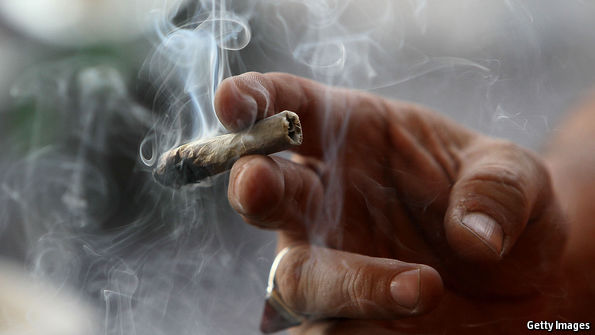You are here
Home 🌿 Marijuana Politics 🌿 America's Pot Industry Shrugs off Donald Trump's Harder Line on Legal Drugs 🌿America's Pot Industry Shrugs off Donald Trump's Harder Line on Legal Drugs

A business that is well used to risk sees greater opportunities ahead.
THESE are high times for America’s marijuana-industrial complex. More than half the country’s states have legalised medical cannabis, often rather loosely defined. Eight have voted to legalise the drug for recreational purposes. The industry was worth about $6bn last year, a figure that is likely to rise sharply in 2018 when recreational sales begin in California.
Yet in Washington, DC, the mellow mood has been harshed. Donald Trump may have said in 1990 that “You have to legalise drugs to win that war.” But after entering politics he became more conservative. While campaigning for the presidency he called Colorado’s legal cannabis market a “real problem”. Last month his press secretary, Sean Spicer, said he expected to see “greater enforcement” of the laws that still ban cannabis at the federal level.
That worries pot peddlers. The fact that they are in breach of federal law means that in theory their profits are criminal proceeds, subject to forfeiture. In 2013 the deputy attorney-general of the day, James Cole, published a memo reassuring states that had legalised cannabis that federal agents would not interfere unless the states allowed the industry to cross certain red lines, such as selling to minors, funding crime or leaking their product into jurisdictions that had not chosen to legalise.
Mr Trump’s attorney-general, Jeff Sessions, has made clear that he sees things differently. During his confirmation hearings before the Senate in January he refused to endorse the Cole memo, saying: “I won’t commit to never enforcing federal law.” A letter from the Department of Justice is all it would take to shut down any cannabis firm.
This has given some investors an attack of paranoia. An index of 50 cannabis stocks kept by Viridian Capital Advisors, a pot-industry consultancy, slid by about a tenth in the week after Mr Spicer issued his warning on February 23rd. The worst-hit were those companies dealing directly with the drug, which are on shakier legal ground than those providing ancillary products and services, such as chemical-extraction machinery or security.
But most investors have kept calm. Viridian’s index is still up by 18% this year. Medical marijuana, which accounts for the bulk of the industry, is expressly protected by a federal law that bans federal agents from interfering in states where it is legal. Mr Trump backs medical cannabis “100%”, as do most Americans. And although only a smallish majority of people favour legalising recreational weed, a large one (including most Republicans) support the right of states to set their own policy on the matter, says a poll by Quinnipiac University.
For now the main impact of Mr Trump’s harder line may be to make entrepreneurs stick extra-carefully to state regulations, rather than “pushing the boundaries” of the law, says Sam Kamin, a professor of marijuana law and policy at the University of Denver. Some have bypassed rules outlawing interstate commerce, for instance, by trading as intellectual-property companies. That sort of thing looks riskier now. But cannabis backers are hardly strangers to risk, Mr Kamin notes. “If you’ve invested your personal fortune in a product that’s prohibited by the federal government, you’re comfortable with a certain amount of uncertainty.”
420 Intel is Your Source for Marijuana News
420 Intel Canada is your leading news source for the Canadian cannabis industry. Get the latest updates on Canadian cannabis stocks and developments on how Canada continues to be a major player in the worldwide recreational and medical cannabis industry.
420 Intel Canada is the Canadian Industry news outlet that will keep you updated on how these Canadian developments in recreational and medical marijuana will impact the country and the world. Our commitment is to bring you the most important cannabis news stories from across Canada every day of the week.
Marijuana industry news is a constant endeavor with new developments each day. For marijuana news across the True North, 420 Intel Canada promises to bring you quality, Canadian, cannabis industry news.
You can get 420 Intel news delivered directly to your inbox by signing up for our daily marijuana news, ensuring you’re always kept up to date on the ever-changing cannabis industry. To stay even better informed about marijuana legalization news follow us on Twitter, Facebook and LinkedIn.




